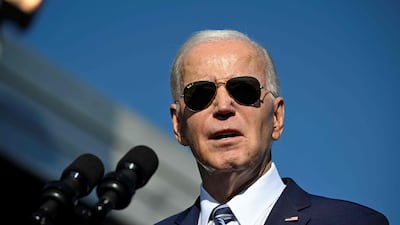Live updates: Follow the latest news on Israel-Gaza
Frederick Hazou sits at a small table outside Patisserie Abu Seir in the Christian quarter of the Old City of Jerusalem, a coffee in hand, the musician and several friends are deep in conversation.
The potential of a cascading conflict between Israel and Gaza, which could draw in neighbouring players such as Hezbollah to the north, has consumed public discourse here since Hamas militants poured into southern Israel and killed more than 1,300 people on October 7.
For Palestinians such as Mr Hazou, Israel’s ferocious response, so far consisting mainly of intense aerial bombardment, has shaken but not shocked.
Those attacks have killed at least 2,750 people, according to the Gazan Health Ministry.
“What's going on in Gaza is something ... it's a catastrophe,” Mr Hazou said.
US President Joe Biden, who has repeatedly said Washington "has Israel’s back", is expected to travel here on Wednesday to relay the message in person.
Mr Biden’s trip comes after Secretary of State Antony Blinken participated in a hectic game of shuttle diplomacy, criss-crossing the region, meeting leaders from Israel, Palestine, Jordan, Egypt, UAE, Qatar and Bahrain over the course of several days in an effort to prevent the conflict from spiralling into a regional war.
According to Mr Blinken, ahead of the President's visit, Washington and Israel "agreed to develop a plan that will enable humanitarian aid from donor nations and multilateral organisations to reach civilians in Gaza".
But Mr Hazou, feels America's response has been mostly one-sided. “They have done nothing [to help us],” he told The National.
It's a sentiment shared by Rami, who runs a small souvenir shop near the Jaffa Gate.
“He only supports the Jewish side and it's not fair,” Rami said of Mr Biden. “He needs to support both sides.”
While Palestinians feel abandoned, Israelis feel quite the opposite and have taken solace in Washington’s strong show of force, which has included sending two aircraft carriers to the region and positioning 12,000 personnel off the coast of Israel.
“It actually warms the heart to hear that the US is with us in this fight,” said Inon Hagbi, a 26-year-old banker.
Israel has amassed a significant fighting force on the border of the Gaza Strip as it prepares for a much-anticipated ground invasion.
For days, Israeli leaders have hinted that the next phase of the conflict would be significant.
'Like a horror movie'
“This will be a long war; the price will be high,” Defence Minister Yoav Gallant said on Monday after meeting Mr Blinken. “But we are going to win for Israel and the Jewish people and for the values that both countries believe in.”
Many Israelis feel that after the events of October 7, the country has no choice but to launch a ground invasion.
“All these stories, it's like a horror movie,” Mr Hagbi told The National. “I think we have to do that [invade]. If we don't go into Gaza, the people will not believe in the government any more.”
And yet for all the bluster and preparation, the Israelis have yet to launch a full-scale ground invasion.
It seems unlikely that Israel will send in troops while the US President is in the region, which has Gerald Steinberg, a professor of politics at Bar-Ilan University in Israel's Ramat Gan, wondering if a ground invasion is in fact inevitable or not.
“I think that it becomes, with each day, more difficult, particularly when Biden is here,” Prof Steinberg said. “If it's not going to happen this week, then it's already been almost two weeks since the massacres.”
The Israeli academic believes Mr Biden wouldn’t travel to the region if the administration didn’t think it could leave with significant deliverables.
“It's unlikely that Biden would come because a failure would be very costly, particularly in an election year unless there was already a plan and discussions of a package that will, when he leaves, demonstrate a successful visit,” he told The National.
David Makovsky, a senior fellow at the Washington Institute for Near East Policy, still believes a ground invasion is likely but perhaps no longer the “centrepiece” of Israel’s response.
“I tend to think it will happen but if it is the same centrepiece the people thought at the beginning is unclear.”
Mr Makovsky called the Biden administration’s efforts so far “remarkable” but warned the situation was far from over.


